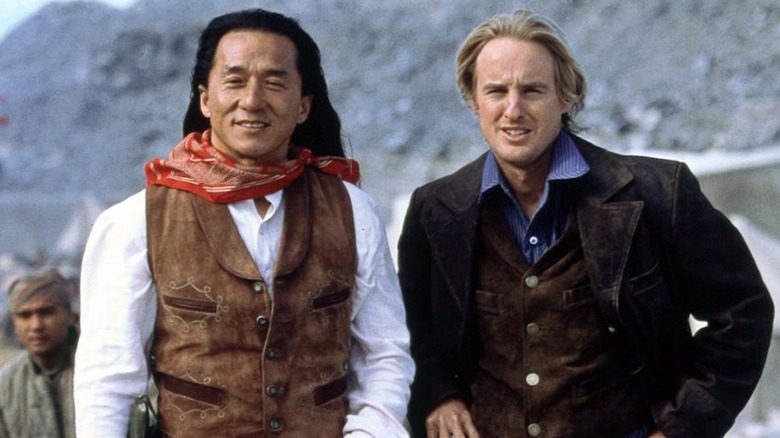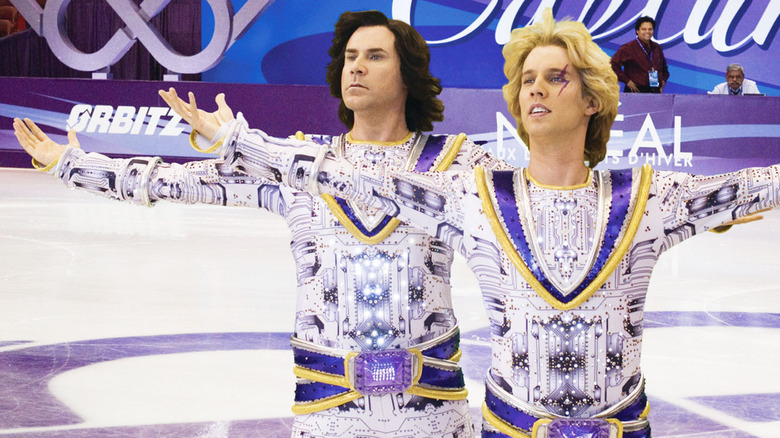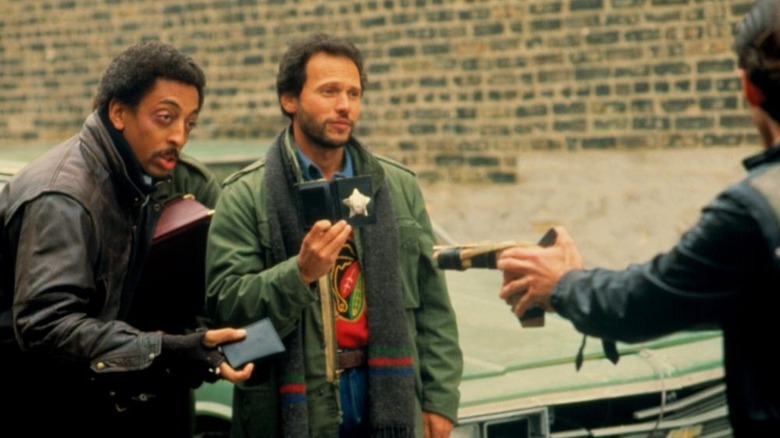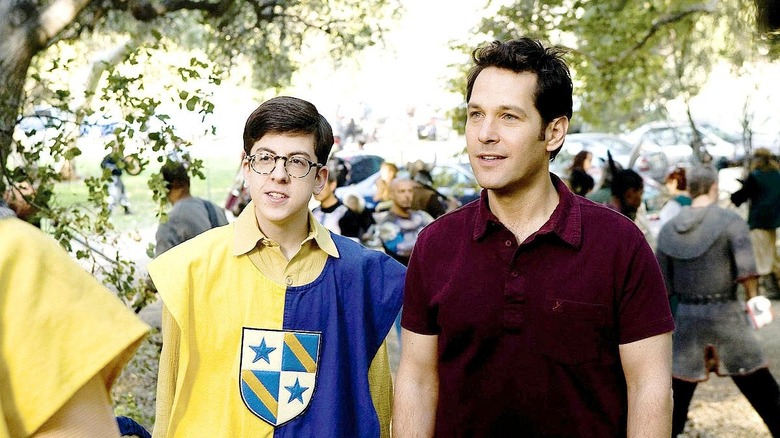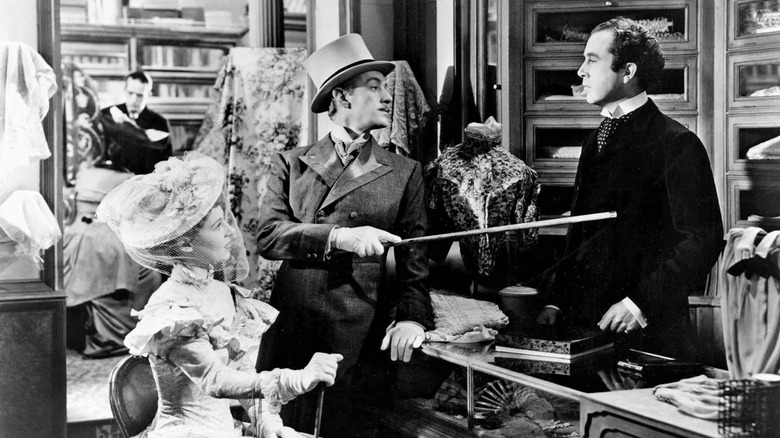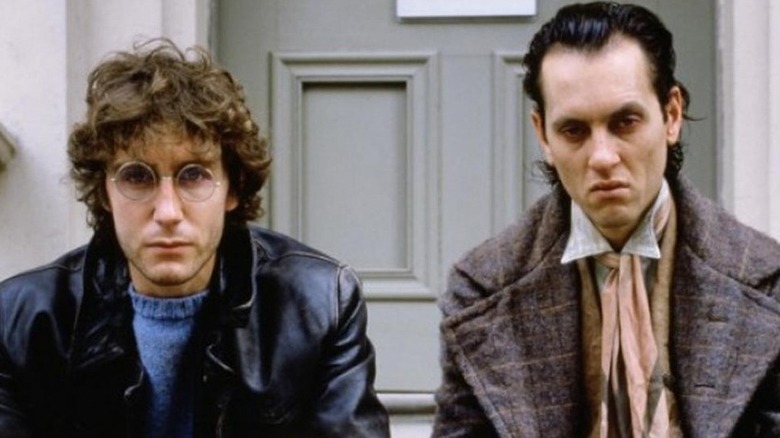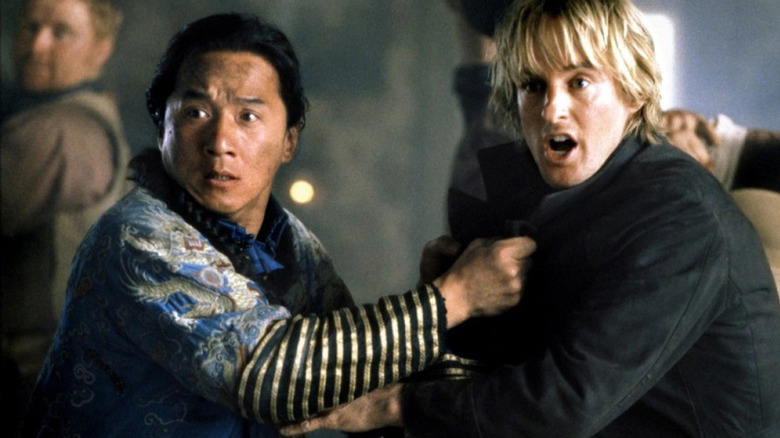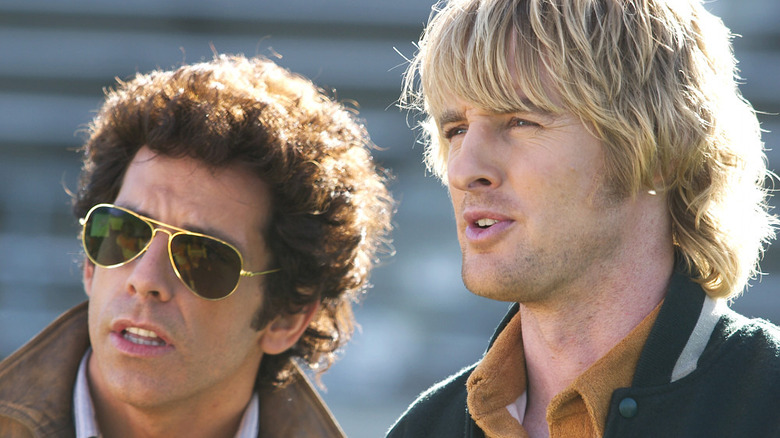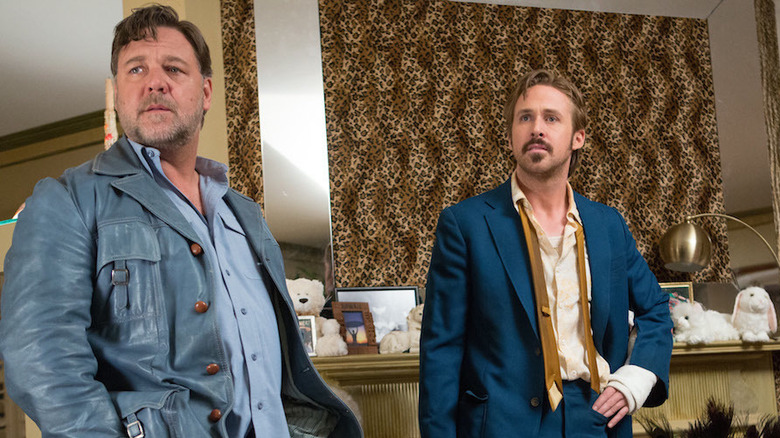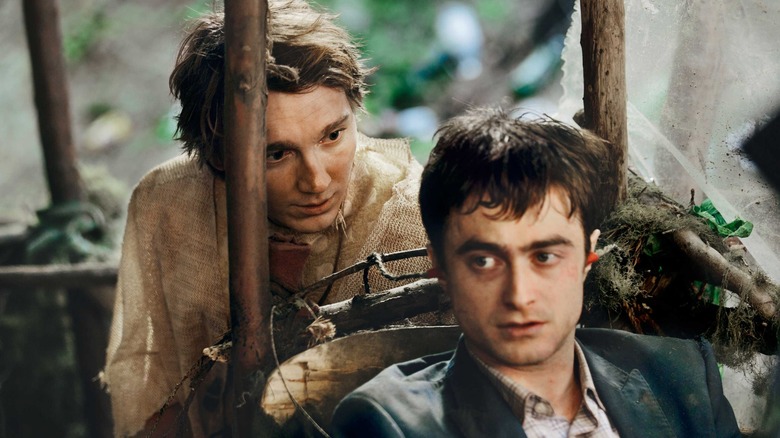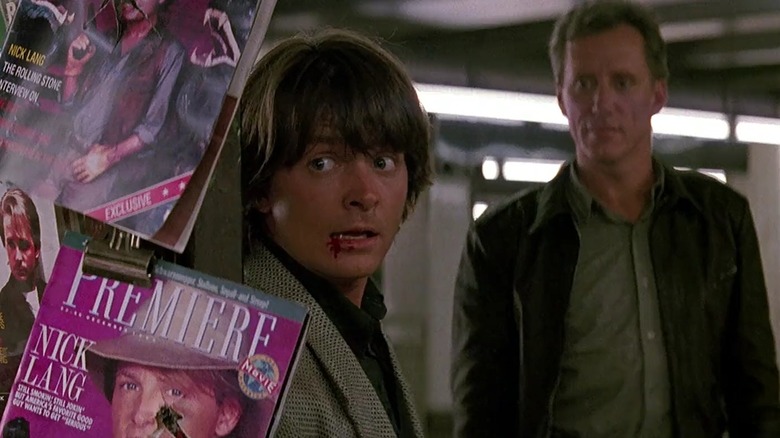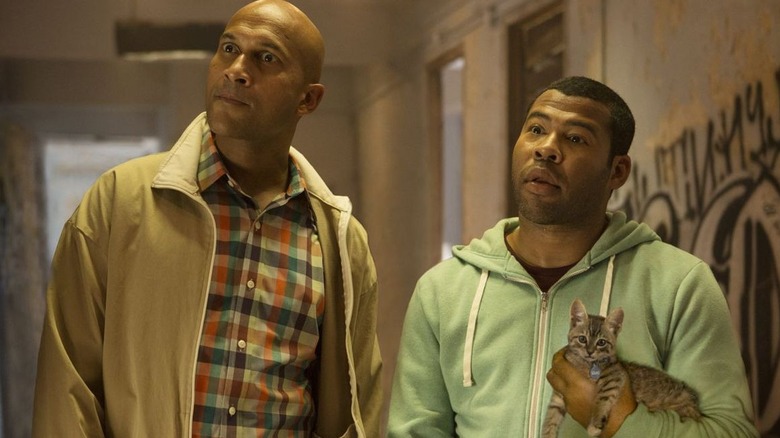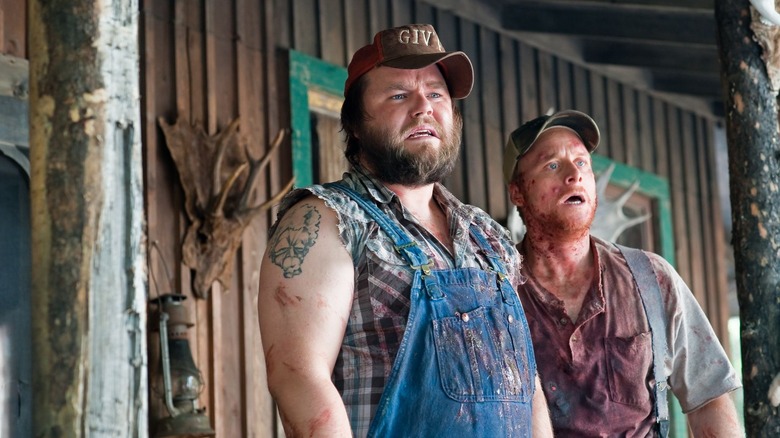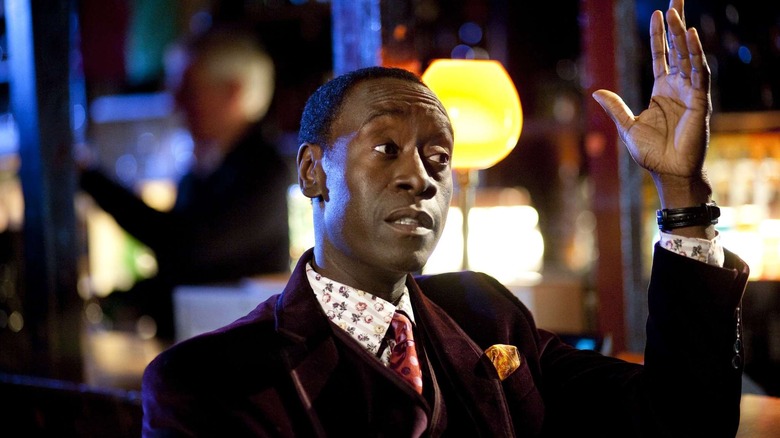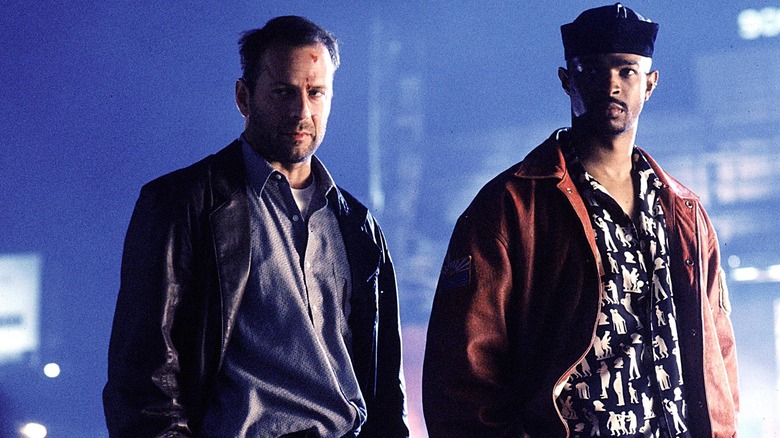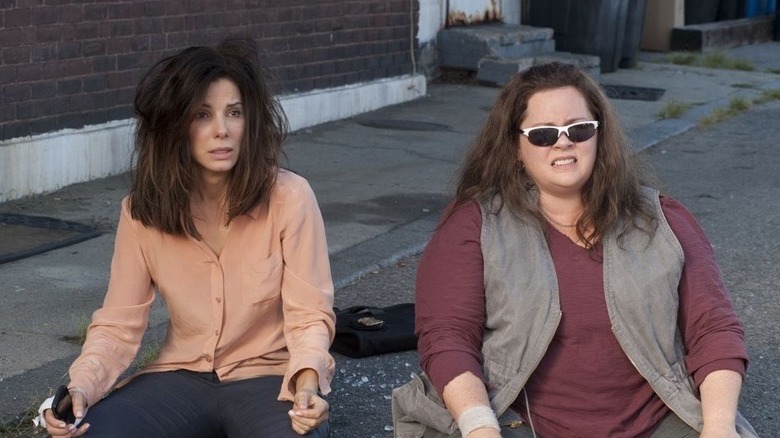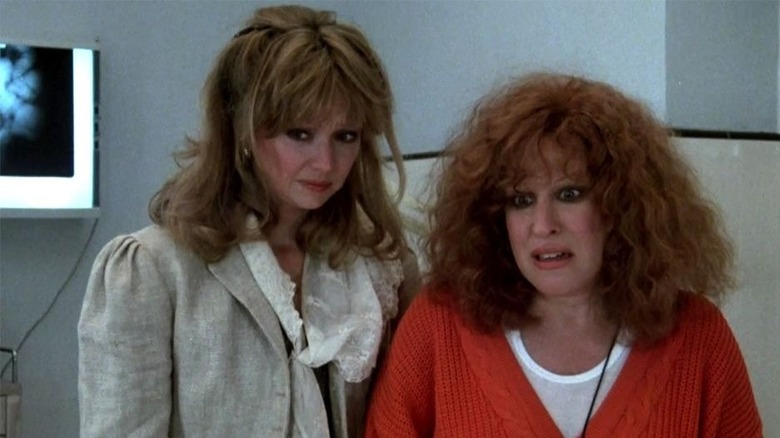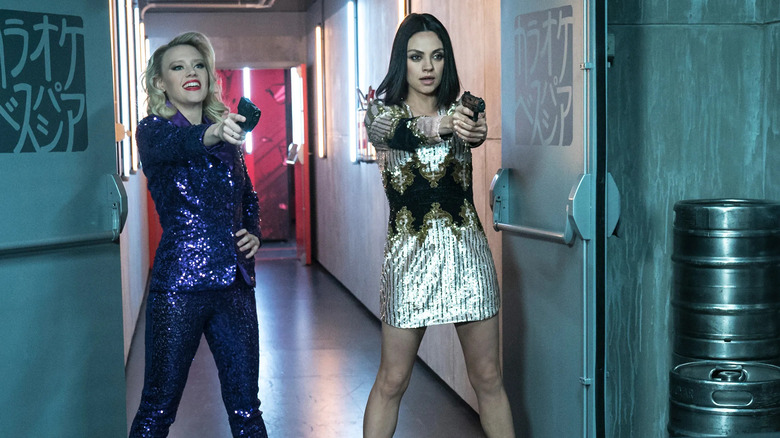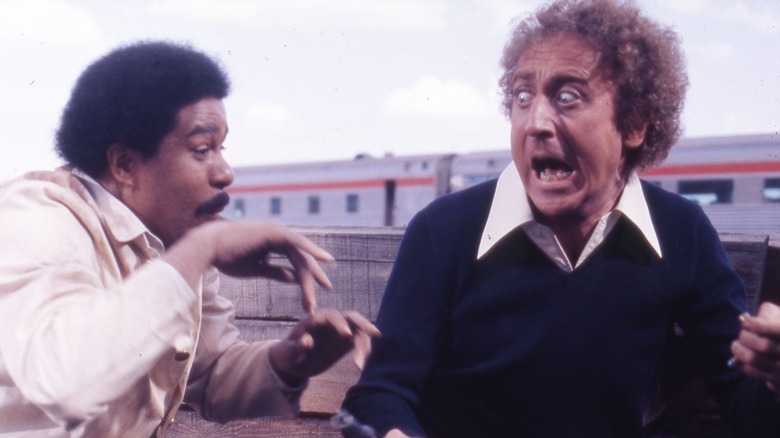Underrated Buddy Comedies That You Should Really Check Out
The world is full of aphorisms about the power of pairs: It takes two to tango, two heads are better than one ... Hollywood gets this. The movie industry thrives on pairing actors together, whether for romantic comedies, action films, or searing dramas. Julia Roberts and Richard Gere. Mel Gibson and Danny Glover. These duos gave us cinema history.
Given that, is it any wonder buddy comedies are so reliably successful? In numerology, "2" represents an elegant strength, focused on a collaborative effort to find peace and balance. In buddy comedies, cooperation is hard to come by; that's the tension that makes them soar. We love watching Chris Tucker and Jackie Chan bicker in "Rush Hour," right up until the moment that they must work together. It never fails.
Buddy comedies are so dependable that many have been lost to time, or have not received the credit they deserve. The buddy films on this list are more than underrated. Taken as a collective, they expand the notion of what a buddy movie is. The genre's best efforts hinge on chemistry — be it between two cops, two drunks, or one man and a farting corpse — and these titles have chemistry in spades. Here are 18 underrated buddy comedies you need to check out.
Blades of Glory
"Blades of Glory" is a sports movie. (We cannot stress this enough.) Yes, Will Speck and Josh Gordon (Marvel's "Hit-Monkey") made a buddy comedy through and through, one of many that Will Ferrell has starred in. It's also a thrilling depiction of Olympic sport. The pairs-skating scenes between bad boy Chazz Michael Michaels (Farrell) and traditionalist Jimmy MacElroy (Jon Heder) crackle with tension. Speck and Gordon are enamored with the ridiculousness of their subject. Accordingly, their film is both dumb and loving.
That's why "Blades of Glory" deserves a spot on this list. It never forgets the needs of its larger-than-life characters: Gold medals, raunchy intercourse, and a deadly skating maneuver called the "Iron Lotus." Those characters also happen to be played by Will Arnett, Amy Poehler, Craig T. Nelson, and the always underrated William Fichtner, just to name a few. If you've never seen it, now's the time.
Running Scared
"Running Scared" is underrated in more than one category. Peter Hyams' buddy cop comedy, which stars the unlikely pair of Billy Crystal and Gregory Hines, is a cut above most "48 Hours" clones. Crystal and Hines' banter feels unscripted and natural. The plot is also genuinely strange to boot. Most action movies don't remove their protagonists from danger for an extended period of time, much less give them what they desire. "Running Scared" does both.
The film's set pieces are truly kinetic. Hyams would go on to make two Jean-Claude Van Damme movies, "Timecop" and "Sudden Death," and "Running Scared" is his audition for both. When Crystal and Hines chase a bad guy (Jimmy Smits) in their cars from O'Hare International Airport to Chicago's public transit Red Line, the movie is indistinguishable from action cinema.
That's the other reason "Running Scared" rules — it's a great Chicago movie. The film captures the Second City's bruised but very proud heart, and sets itself in local neighborhoods and landmarks alike. Anyone who's lived there will be thrilled by "Running Scared," as will cinema and comedy fans. It checks all the boxes.
Role Models
Few artists are more perpetually underrated than David Wain. Wain was a member of both The State and Stella, two important alt-comedy troupes. He went on to direct the cult-classic "Wet Hot American Summer," and serve as a creator and producer of its Netflix follow-up, along with Adult Swim's "Children's Hospital," and many others. Wain is a legend, but he is lesser-known than his Stella compatriots Michael Ian Black and Michael Showalter. This is understandable as Black and Showalter appear on-camera far more often than Wain. But, to quote Scarlet Witch, "It doesn't seem fair."
It's equally unfair that "Role Models" is so underrated. The movie is Wain's third feature, and the first to receive a wide release. It's about two ne'er-do-well energy drink salesmen played by Paul Rudd and Seann William Scott, who must do 150 hours of community service for a litany of offenses. That's a stellar elevator pitch made all the better by Wain's script, which blends his trademark absurdism with more traditional character arcs. "Role Models" is a feel-good comedy in the tradition of "School of Rock" or "Napoleon Dynamite" — it just takes a raunchier path to its crowd-pleasing resolution.
There are riffs on KISS' genitalia and even a Jane Lynch monologue about bagel dogs. There's the reliably crude yet sweet work of Rudd and Scott, who have rarely been more appealing. And, there's the shaggy but expert direction of Wain, who stages a killer LARPing sequence.
Kind Hearts and Coronets
One could argue "Kind Hearts and Coronets" isn't a buddy comedy, and they'd be right. The Criterion-cosigned classic is darkly funny and features the incredible chemistry of Alec Guinness and Dennis Price. However, there isn't a single pairing of characters that you would call buddy-like. The film is about murder. More specifically, it's about murdering an entire line of succession to earn dukedom. It is a far cry from "Rush Hour."
That said, "Kind Hearts and Coronets" hinges on the irascible appeal of Guinness and Price acting together, and, in this way, it's more buddy comedy than not. Every film in the genre is about disparate people that find common ground. In "Kind Hearts and Coronets," that journey's meta-textual. Guinness plays every person in the line of succession Price is shortening (eight in total). His multi-faceted, multi-character performance acknowledges he and Price are in on the gag. That leads to a delirious series of comedically violent set-pieces, feeling like well-mannered predecessors to Shane Black's oeuvre and "Withnail & I." In this way, "Kind Hearts and Coronets" walked so the buddy comedy could run. It should be watched by any student of the genre.
Withnail & I
"Withnail & I" is really only underrated in America. Bruce Robinson's alcohol-soaked comedy classic is a beloved cult film in the U.K. and kick-started Richard E. Grant and Paul McGann's careers. The legendary artist Ralph Steadman (best known for his collaborations with Hunter S. Thompson) created the film's theatrical release poster, which was then repurposed for the film's Criterion release. Those plaudits should indicate how celebrated "Withnail & I" is. Why, then, is it underrated? Simple: It's sad.
Buddy comedies are rarely tragedies in the States: We buy tickets to watch the stars come together, assuming they will have happy endings. When "Withnail & I" begins, its misanthropic, alcoholic leads are already bonded, and not just to each other. They are lost in a haze of pills, booze, and lighter fluid. Their lives are low-key horrific and become more so as the film progresses. This allows Robinson to take biting shots at English countryside manners, bid farewell to the hippie era, and explore what radical honesty looks like. "Withnail & I" is profane and profoundly truthful, suggesting one must be both. It's the least watered-down buddy comedy in cinema history, and one that everyone should see, British or not.
Shanghai Noon
"Shanghai Noon" is less watered-down than you remember. Jackie Chan's follow-up to his wildly successful film "Rush Hour" has nearly been lost to time. It was once a cable TV staple, now buried on Disney+. "Shanghai Noon" is a better movie than all three "Rush Hours," boasting a strong action choreography, a shockingly rich ensemble (Lucy Liu, Xander Berkeley, Walton Goggins), and an all-time turn from Owen Wilson. Wilson is one of our most unlikely movie stars, but in "Shanghai Noon," he figured out how to shine.
Wilson's secret weapon is misdirection. If the story wants to zig, Wilson must zag. Hollywood tried to transform him into a bumbling clown, which was a shallow read on his gifts. Wilson is chaotic good on the Dungeons & Dragons alignment system, a constant disruptor of the status quo who often improves it. In "Shanghai Noon," Wilson's Roy O'Bannon is a dreamer; he's also Wyatt Earp. He almost breaks the film's fourth wall on more than one occasion, and flits between being badass and useless. Wilson makes this all makes sense, though, when he stops making sense. He plugs into his ephemeral instincts and lets them rip alongside Chan's technical mastery. They aren't oil and water; they're gasoline and an intake stroke. Both Chan and Wilson would make other buddy comedies (one of which is on this list), but none better than this.
Starsky & Hutch
"Starsky & Hutch" is remembered for reuniting Owen Wilson and Ben Stiller. It features the impeccable casting of Snoop Dogg as Huggy Bear and one genuinely timeless gag. Some might think calling this movie underrated is a reach, but it's time to admit that "Starsky & Hutch" is both better than it's given credit for and the best movie Todd Phillips has made or will ever make.
Over the course of two-plus decades, Phillips has shown us who he is — a facsimile artist who excels at pastiche. "Joker" is effective when it approaches the work of Scorsese and fails when it can't channel it. "Old School" takes all its cues from classic college comedies. Meanwhile, "Starsky & Hutch" isn't trying to be anything more than a hodgepodge homage. There are more winking nods to the original show and its dated elements than you can shake a stick at. Phillips revels in the picture's window dressing, shooting '70s muscle cars with almost fetishistic glee. That's right for the source material. He isn't reaching; he's perfectly in his lane. "Starsky& Hutch" scorches comedic tarmac. If you haven't seen it, do it. Do it.
The Nice Guys
It's a stretch to include "The Nice Guys" on this list. It's an eminently rewatchable work that announces Russell Crowe's character actor phase, and features Ryan Gosling giving one of the century's best comedic performances. Every scene in "The Nice Guys" is on-point, so it's hard to argue that the movie is underrated. And yet, it is.
There have been three "Rush Hour" films. There are two "Ted" movies. We got two "Jump Street" installments, and a "Men In Black" reboot. There is room for a second "Nice Guys," and there's an audience for it. It's the audience that has followed filmmaker Shane Black from "Predator" to Marvel, and made "The Nice Guys" a quarantine staple. It's the audience that likes popcorn films with indie sensibilities (think "Kimi," or "Everything Everywhere All At Once"). The fans are out there, and the fact that a follow-up film isn't in the pipeline when sequels, reboots, and prequels are Hollywood currency feels nuts. That's why "The Nice Guys" is underrated.
Swiss Army Man
No one said both buddies in a buddy comedy had to be alive. That's one of many ways "Swiss Army Man" subverts audience expectations. No one expects to see a movie that opens on a man attempting to take his life (Paul Dano) after ages spent lost on an island. Less people expect that movie to dovetail into a flatulent corpse (Daniel Radcliffe) that washes ashore and can be manipulated like a Swiss Army knife. This describes the first 20 minutes of the film, and things only get wilder from there.
Simply put, "Swiss Army Man" is excellent. It features iconic work from Dano and Radcliffe, the former of whom gives an exceedingly vulnerable performance. Radcliffe, meanwhile, used the role of Manny to leave Harry Potter behind forever. (The actor's idiosyncratic, post-Potter choices can't be praised enough, but "Swiss Army Man" is the feather in that cap.) Most importantly, it's a buddy comedy about self-love. We have to be our own best buddies to live fruitful lives. We can only find others if we know ourselves first. These are age-old tenets, but "Swiss Army Man" makes them feel funny and fresh. It's much more than the farting corpse movie.
If you or anyone you know is having suicidal thoughts, please call the NSP Lifeline at 1-800-273-TALK (8255).
The Hard Way
"The Hard Way" features Michael J. Fox, James Woods, and a surprisingly sharp script. That makes the action-comedy sound unremarkable, and it sort of is. In the film, an action star (Fox), who's hoping to raise his credibility, gets paired with an actual police officer (Woods). Mayhem ensues, but you've seen tons of movies like it. Again, unremarkable.
So why is "The Hard Way" listed here? Madcap energy. John Badham's film offers Fox and Woods at their comedic peaks. At this point, neither had settled into their movie stardom yet, and both bring their A-game. (Woods, in particular, seems to relish being the anti-Doc Brown.) As a result, "The Hard Way" feels like a '40s screwball comedy. The film's cast also features a deep bench of talent, including Stephen Lang pre-"Avatar," Annabella Sciorra, and the always underrated Luis Guzmán. "The Hard Way" won't change your life, but not all movies should. Some are fun and breezy. "The Hard Way" makes moviemaking feel simple; maybe it's sort of remarkable after all.
Keanu
"Keanu" is underrated because of Jordan Peele, and that feels impossible. The 43-year old writer-director has made two classic horror films with a third on the way. Before becoming an auteur, Peele co-created the game-changing TV comedy "Key and Peele" with Keegan-Michael Key. How could his work be underrated?
In the case of "Keanu," it's because the film gets conflated with Peele's directorial efforts, but he only co-wrote it. "Keanu" was helmed by Peter Atencio, a frequent collaborator on "Key and Peele," helping to contribute to the film's sketch-but-make-it-full-length aesthetic. "Keanu" is about a man whose kitten gets stolen by a thief and the cousin that helps him retrieve it, but it's an excuse to unleash mass comic absurdity. There's an excellent sequence where a gang gets to know each other before riding out to war. They share two things about themselves, two of which are: "I got stabbed by my mother ... and my grandmother," and "I had tickets to a super-advanced screening of 'The Blair Witch Project.'"
There's a chance you just laughed out loud. That's what "Keanu" is — a hilarious buddy comedy with energy to spare.
Tucker and Dale vs. Evil
"Tucker and Dale vs. Evil" is a classic. Eli Craig's debut feature is more than a wonderful buddy comedy; it's one of the all-time great horror comedies. It has inventive scares and sharp, comedic set-pieces. The setup is ingenious: Tucker (Alan Tudyk) and Dale (Tyler Labine) are two best friends who have bought the backwoods vacation home of their dreams. That home happens to be a cabin straight out of Sam Raimi's "The Evil Dead" or, yes, Drew Goddard's "The Cabin in the Woods." When a group of bumbling college students show up and mistake Tucker and Dale for "redneck murderers," hijinks ensue. Those hijinks turn sinister when the kids start dying. Is it all a comedy of errors? Or is something more ominous afoot?
"Tucker and Dale vs. Evil" provides smart answers to those questions. At its core, the film is about misperception, identity, and how one can inform the other. Tucker and Dale are remarkably self-actualized, but the students' shallow judgment of them clouds that clarity. Conversely, Tucker and Dale underestimate Allison (a never better Katrina Bowden), who is much more than your typical "final girl."
The Guard
Almost every Martin McDonagh movie is a buddy movie. The keyword there is "almost." "Three Billboards Outside Ebbing, Missouri" certainly isn't, but "In Bruges" definitely is. And "Seven Psychopaths" is almost several different buddy movies in one, each hinging on separate pairings. The buddy movie looks good on McDonagh. His roots are in the theater, a medium that favors watching characters speak to one another.
The buddy movie is an especially good fit for McDonagh's brother, John Michael McDonagh. His debut feature, "The Guard," is absolutely a buddy comedy. It inexplicably pairs "In Bruges" star Brendan Gleeson with world-beater Don Cheadle. That's an inspired decision. Gleeson is all caustic edges, and Cheadle is mischievous smoothness. Their dynamic is closer to Magic Johnson vs. Larry Bird than co-collaborators, and McDonagh milks it for all its worth. The story, which concerns a vulgar cop (Gleeson) and FBI agent (Cheadle) taking down a drug ring, is secondary to the sterling banter. That's the point; watching Gleeson and Cheadle bicker is cinematic enough.
The Last Boy Scout
"The Last Boy Scout" is utterly unhinged. That's no hyperbole. Shane Black and Tony Scott's sleazy buddy cop comedy opens with a kickoff return mid-football game. As the player ducks and weaves through his opponents, the opposing team's end zone comes into sight. There's one man between him and a touchdown. The returner pulls out a gun and empties a clip into that man and, no, you didn't misread that.
On-field murder is hardly the craziest thing that happens in "The Last Boy Scout." There are poorly-timed jigs and scenery-chewing villains. There's the uber '90s chemistry of Bruce Willis and Damon Wayans, who spend the movie flexing muscles and comedic chops. More than anything, there's a gonzo approach to action that's almost transgressive. Everyone involved was at the peak of their game. "The Last Boy Scout" is what they got away with. It's a blank check cashed, burnt, and tossed onto the big-screen.
The Heat
Many flagged "The Heat" as predictable, and it is. But, the movie is predictable by design. Paul Feig and writer Katie Dippold relish the opportunity to take the cliches of the buddy comedy and buddy cop genres and unleash Sandra Bullock and Melissa McCarthy upon them. It plays like gangbusters. The film careens from memorable set piece to memorable set piece, clicking like a well-oiled machine that almost goes off the rails.
More than anything, "The Heat" cements Bullock and McCarthy as an all-time paring. McCarthy has always needed a foil, and in Bullock, she finds her ideal match. Bullock is a comic dynamo in her own right, and she channels those abilities into her character's uptight, exacerbated frustration. When that anger collides with McCarthy's gung-ho, manic energy, sparks fly gloriously. (The scene where both actors attempt to enter an interrogation room first is a master class in slapstick, and should be studied in clown colleges everywhere.) "The Heat" is proof that the male-dominated buddy cop genre is not just great with women at the helm — it's even better.
Outrageous Fortune
Speaking of women who make the buddy comedy better, there's an alternative universe in which we get several Shelley Long and Bette Midler movies. Both women are supernovas in their own right: Long is an Emmy and Golden Globe winner for her work on "Cheers," and Midler is an institution. Her canon is legendary and earned her diva status decades ago. Whether you love her in "Hocus Pocus," "Beaches," or for her myriad of live albums, there's no denying her impact.
That's one reason "Outrageous Fortune" is so revelatory. It pairs two talents capable of standing alone and reveals new facets of their gifts in the process. Half theater scene parody and half action-comedy, Arthur Hiller's film concerns two acting students (Long and Midler) whose legendary professor (Robert Prosky) dies under mysterious circumstances. When they come to believe he faked his death, incredulous plot twists start piling up. Long and Midler are irresistible together, and Hiller infuses the proceedings with maverick energy. "Outrageous Fortune" scores high buddy comedy marks. It was underappreciated in its time and still is.
The Spy Who Dumped Me
Kate McKinnon is an ideal buddy comedy actor. The "Saturday Night Live" superstar has a singular on-screen presence. Even at her most naturalistic, McKinnon feels larger than life — she vibrates at a different frequency than most humans, let alone performers. (This was evident in Jay Roach's "Bombshell," which paired McKinnon with Margot Robbie, an equally colossal and idiosyncratic talent.) Finding a foil for McKinnon offers delicious possibilities.
For director Susanna Fogel, the most thrilling was Mila Kunis. Kunis and McKinnon play opposite each other in Fogel's "The Spy Who Dumped Me," a movie that marries the genre riffs of "The Heat" with the elevated banter of "Booksmart." This combo of influences makes sense: Fogel co-wrote "Booksmart," and it's a wonder more fans of that film haven't seen her sophomore feature. Fogel is a breezy but technically precise director. Take the scene with the gymnast assassin: Fogel leaves room for McKinnon and Kunis to riff even as she choreographs a tight shootout amongst dusty Olympic equipment. It's exciting for both action and comedy fans.
That's why "The Spy Who Dumped Me" is underrated; Hollywood gets how good it is, even if the public doesn't. Fogel parlayed this film into helming "The Flight Attendant" pilot (a smash for HBO Max), and McKinnon has done almost anything she's wanted to since it was released in 2018.
Silver Streak
Are Gene Wilder and Richard Pryor the greatest buddy comedy duo ever? They have stiff competition to be sure. Simon Pegg and Nick Frost are the modern gold standard. If Channing Tatum and Jonah Hill get a third great film under their belts, they'd be heirs to the title. But Wilder and Pryor set the standard. Their oil-and-water energy, and equal comedic gifts, were a gift to the cinema then and now. While Sidney Poitier's "Stir Crazy" is the film they are best remembered for, "Silver Streak" deserves credit, too. It's a Hitchcock riff and side-splitting comedy rolled into one.
On a cross-country train ride, book editor George Caldwell (Wilder) enters a whirlwind romance with Hilly Burns (Jill Clayburgh). Things quickly go south when Caldwell witnesses a murder and Hilly is kidnapped, leaving Caldwell to team up with Pryor's Grover Muldoon, a car thief and a thorn in Caldwell's side. The film is just as silly as it sounds, but its ridiculousness comes via bona fide talent. Directed by Arthur Hiller, the movie's energy is bolstered by Henry Mancini's lush score, along with sharp, supporting turns from character actor all-stars Ned Beatty and Richard Kiel.
